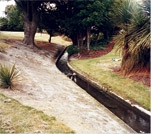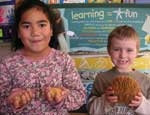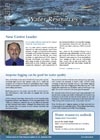PDF of this article (120 KB)



When is a sponge not a sponge?
Do you know what sponges are? Plants. Sponges. Things with holes in them.
Do you know what this is? (I show the children a rock-like fossil sponge.) Dinosaur sponge. Sponge bones. A stone.
What would happen if I put this SPONGE in the water? It will float. It will fill up with water. It will drown.
What would happen if I put this FOSSIL in the water? It will sink.
Tell Dr Kelly what a ‘consequence’ is. It’s something that happens when you decide to do something (from Isaiah, a budding young scientist).
Wow, I thought, amazing understanding from a six-year-old. And so began my hour of discussing being a scientist and sponge specialist with the class my daughter teaches at Mangere Bridge Primary School. The children were studying materials and matter and the concept of consequences: If you do this, what will happen? What is the consequence of this action?
Sponges are filled with holes. That’s why they fill up with water. BIG holes in the sponge make it fill up really quickly. Sponges with small holes float at first. The fossil doesn’t float. Why? No holes.
It will be interesting to see how much the kids ABSORBED and what came out of their writing session following my visit.
Q. So, when is a sponge not a sponge? A. When it’s a rock.
For further information, contact: Dr Michelle Kelly, 09-375 3847, [email protected]
Eyes on the prize
Emily Webster, from St Cuthberts College in Epsom, was the 2006 winner of the NIWA Auckland Science Fair. Her project examined the efficiency of different tree types for converting carbon dioxide to oxygen, and the work is now on public display at the NIWA offices in Auckland.
As part of her prize, Emily had a tour of the NIWA aquaculture research facility at Mahanga Bay in Wellington, as well as a day trip to Little Barrier Island.
Emily’s interest in global warming issues focuses her attention on finding ways to reduce atmospheric carbon concentrations through carbon sequestration. The trip to Mahanga Bay inspired her project for 2007: investigating shellfish farming as a way to sequester atmospheric CO2. She will experiment with shellfish samples from the Coromandel Peninsula, where she lives and where there are many mussel and oyster farms.
For further information, contact: Drew Lorrey, 09-375 2055, [email protected]
Training at NIWA
NIWA offers a wide range of courses each year. They are presented at a number of venues according to need and level of interest, and in some instances can include in-house training at your premises. Courses offered in the next six months include:
Electric fishing for machine operators, 18–19 September, Christchurch
Hydrological statistics, 12 October, Christchurch
Identifying New Zealand’s native fish, 16–17 October, Hamilton
Targeted riparian management, 5–6 November, Hamilton
Beach profile analysis toolbox (BPAT), 6 November, Christchurch
Instream habitat – survey and analysis, 7–8 November, Hamilton
Water quality data – from collection to interpretation, 13 November, Hamilton
Identifying wetland sedges and rushes, 29–30 January, Hamilton
Identifying algae in rivers and lakes, 13–14 February, Christchurch
Identifying aquatic macrophytes, 19–20 February, Christchurch
For further information, contact: NIWA Training Coordinator phone 0800 RING NIWA (0800 746 464) or email [email protected]
www.niwascience.co.nz/edu/training
NIWA Science & Technology Fairs in 2007
NIWA is proud to sponsor five of the nation’s regional science and technology fairs. In addition to providing funding and prizes, each year NIWA supplies staff to assist with event organisation and with judging.
Dates and venues for 2007
- Auckland City, 15–18 October, Alexandra Park
- Bay of Plenty, 30–31 August, Rotorua Convention Centre
- Nelson, 18–22 August, Stoke Memorial Hall
- Waikato, 23–25 August, Hamilton Gardens
- Wellington, 22–25 August, Victoria University
For further information, contact:
Dr Julie Hall, 07-856 1709, [email protected]
